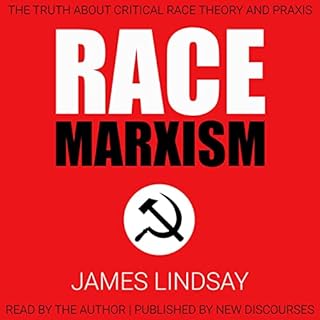Eric M. Thompson
- 1
- revisión
- 0
- votos útiles
- 1
- clasificación
-
Race Marxism
- The Truth About Critical Race Theory and Praxis
- De: James Lindsay
- Narrado por: James Lindsay
- Duración: 12 h y 43 m
- Versión completa
-
General5 out of 5 stars 208
-
Narración:5 out of 5 stars 182
-
Historia5 out of 5 stars 182
Critical race theory is one of the hottest and most controversial topics in the world today, but what is it, really? Rightly understood, critical race theory is a reinvention of an older, terrible idea, Marxism, using race "as the central construct for understanding inequality" in place of economic class. That is, critical race theory is race Marxism. The evidence of this claim is so overwhelming upon even casual examination that it is a shock that it isn't immediately plain to everyone who encounters it.
-
5 out of 5 stars
-
Lindsay has done the work
- De Ashley King en 08-02-22
- Race Marxism
- The Truth About Critical Race Theory and Praxis
- De: James Lindsay
- Narrado por: James Lindsay
Great but for one criticism
Revisado: 06-29-23
As someone who found Lindsay and Pluckrose’s Cynical Theories a flawless piece of analysis, I was eager to read more of what Lindsay had to say. I found Race Marxism well analyzed, researched, documented and articulated in general, but I do have a couple points of critique. The first is very minor. Stylistically it was a bit repetitive. The second is more substantive. I found his sprinkling of comments on religion throughout the work interesting and at times problematic. In general, I think he gives religion too much credit. His analysis of CRT as a religion of a fundamentalist type is spot-on, but in his defense of western civilization he gives mainstream religion—Christianity in particular— too much credit. Specifically, he makes two statements I find false or objectionable. 1, in the context of elaborating CRT as a gnostic religious cult—a point I emphatically agree with—he refers to the biblical story in Genesis 3, characterizing it as “the false promise of the serpent.” I speak here as a Bible scholar with a 36 year career teaching Hebrew and biblical literature in college and graduate school. In Genesis 3, the snake (serpent is just a fancy word for snake) did NOT give a false promise. Read attentively in Hebrew (but a decent English translation serves as well) the snake in Genesis 3 tells the truth. He says “the day you eat (the fruit of knowledge) your eyes will be opened and you will be like gods knowing good and evil”. In the story, the 3rd person omniscient narrator, upon their eating the fruit says their eyes were opened and they knew they were naked (Gen 3:7). Then later Yahweh, the god, says “now they have become like one of us knowing good and evil” (Gen 3:22). In other words, what the snake said would happen if they ate the forbidden fruit is exactly what DID happen as reported by the narrator and god. It was NOT a false promise but exactly the truth within the story world. Lindsay repeats a common religious trope that misrepresents the Hebrew text. 2. Lindsay refers to Marx dismissively as an “angry atheist.” Now I basically agree with Lindsay’s analysis of Marx and his relation with CRT. But please, “angry atheist” is a tired, bigoted stereotype. I don’t know Lindsay’s religious commitments. While listening to the book I found myself suspecting he is some form of Christian, without any idea that suspicion is correct. And if he is that is okay, but those 2 passages, plus several religion-friendly remarks throughout the book, I could have done without. Marx was certainly an atheist, as am I, but whether he was “angry” is irrelevant and an ad hominem fallacy. These criticisms are a trifle nitpicky. Basically I loved the book, learned from it, and agreed with all its major points. I recommend it to anyone in the thrall of Woke, DEIA, and all variants, or anyone who wants to understand the issue. I would also add that I agree with Lindsay’s urgency. This is a threat to our well being.
Se ha producido un error. Vuelve a intentarlo dentro de unos minutos.
Has calificado esta reseña.
Reportaste esta reseña

